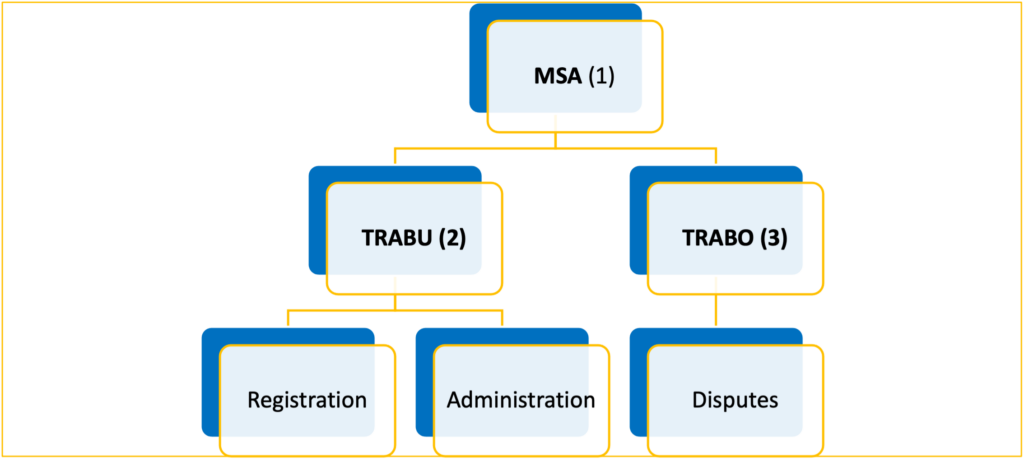
This article was first published on LinkedIn on February 18, 2021, by our Founder Nicolas Coster. Considering the number of questions and challenges in terms of trademarks in PRC (People’s Republic of China), it has been updated here.
The PRC Trademark Law was revised in 2019. It includes 8 chapters and 73 articles in total. With the purpose of strengthening trademark administration, this law aims at (article 1):
- Protecting exclusivity.
- Ensuring quality.
- Safeguarding reputation.
- Protecting stakeholders’ interests: consumers, manufacturers, business operators and the market economy.
Unsurprisingly, honesty and trustworthiness are key principles appearing throughout the whole text. Prior trademark right holders also hold a special place and benefit from a strong protection (article 32).
What is a trademark according to PRC law, why and how is it registered, and which are the state organs involved in trademark matters? These are the questions we will answer here.
- WHAT IS A TRADEMARK?
PRC trademark law enacts a thorough definition of trademarks, explaining what a trademark could be and what it cannot be.
Different types of trademarks
Distinct categories of possible trademarks are listed (articles 3 and 16).
- Commodity trademarks: trademarks on a commodity, a product.
- Services marks: trademarks on services.
- Collective trademarks: trademark registered on behalf of a group, association or any other organization for the use of their members.
- Certification marks: controlled by organizations with supervisory capacity over certain commodities or services, characterized by specific features (place of origin, raw materials, manufacturing method or quality).
- Geographical trademarks: marks including geographical data to indicate that certain commodities are sourced from certain regions, with the idea of a specific quality, reputation or other characteristics thanks to natural or human factors.
Characteristics
Two main characteristics are found to be essential for trademark registration:
- Differentiation (article 8): as a consequence, generic marks, descriptive marks, marks lacking salient features or only representing characteristics are not allowed (articles 11 and 12).
- Distinctiveness (article 9): as a consequence, prior right holders benefit from a special protection, but also well-known trademarks for example, even if not registered in China (articles 13 and 14).
Exclusions
Are clearly banned from trademark registration (article 10):
- Some geographical names, country names, flags.
- Discriminatory or deceptive and misleading marks.
- Any trademark detrimental to socialist morals or having any other adverse effect.
- WHY REGISTERING A TRADEMARK
The main purpose of registering a trademark is of course obtaining exclusive rights on this trademark (article 3) and be able to oppose these rights on others in case of wrongdoing.
In order to achieve this purpose of protecting prior right holders, infringements to PRC trademark law are punished with different types of penalties (articles 51, 52, 53, 60, 65, 66), ranging from order to make corrections to confiscation, fines, compensation and even criminal liability.
- WHO CAN FILE A TRADEMARK?
There are different ways of applying for a trademark (article 5 and 18):
- Individually, meaning personally.
- Jointly, to enjoy joint exclusive rights.
- Through a lawfully established entrusted trademark agency.
Cautious: foreigners or foreign enterprises must mandatorily go through a trademark agency.
Trademark agencies are strictly regulated and must act according to the following principles (articles 19, 20 and 68):
- Honesty, trustworthiness: for instance, the trademark agency must notify the applicant in case the registration is not allowed.
- Under the limit of the entrustment given by the applicant.
- With respect to confidentiality and commercial secrets.
- In compliance with laws and regulations.
- Under the supervision of a trademark agency industry organization (with members admission and penalties for infringement).
- THE STATE ORGANS INVOLVED WITH TRADEMARK REGISTRATION
Diagram: the PRC state organs for trademark matters

(1) MSA is the Market Supervision Administration, previously Administration for industry and commerce department of the State Council
(2) TRABU: Trademark Bureau, in charge of registration and administration
(3) TRABO: Trademark Review and Adjudication Board, in charge of disputes
In terms of trademarks, the MSA, including the TRABU and the TRABO, have in fact extensive powers, such as:
- Asking for explanation and corrections (article 29).
- Asking to submit a trademark application (articles 51 and 52).
- Investigating powers, such as interviewing, examining information and facts, accessing and copying materials, onsite and articles inspection, seizing and confiscating (articles 35, 61 and 62).
- Handling disputes and mediation (article 60).
- FIRST COME FIRST SERVE
In terms of trademark registration, better be fast (article 31):
- Between two similar applications, the earliest will prevail.
- Between two similar applications on the same day, the trademark with the earliest usage will prevail.
Early application is also paramount since registrations take time. Roughly, it will take a minimum of 6 months to obtain a first decision from the TRABU on your trademark application (articles 28). This timeframe can be more than doubled in case of objections or procedure with the TRABO (articles 34 and 35).
Once registered, your trademark will be valid for 10 years, renewable (articles 39 and 40).
During this time, you will enjoy exclusive rights on your trademark and be able to transfer or license your trademark under specific conditions (article 42 and 43).
Keep in mind that even registered, a trademark can be revoked, in particular if it has not been continuously used for 3 years (article 49), but also invalidated (article 44).
Conclusion
Our tips on Chinese trademarks?
Be first and always prefer a local filing to obtain a Chinese registration certificate (article 33), required by some online platforms to sell through them (Alibaba, Taobao, etc.).
What is the risk here? Someone else might file your trademark before you, forcing you to pay to get it transferred back.




